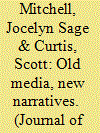|
|
|
Sort Order |
|
|
|
Items / Page
|
|
|
|
|
|
|
| Srl | Item |
| 1 |
ID:
178584


|
|
|
|
|
| Summary/Abstract |
How are nationalism and national identity shifting in Qatar as a result of the regional crisis? This study explores whether this moment of geopolitical fluidity allows for changes in sociocultural behavior and norms among Qatari citizens. Specifically, this research uses the case study of the newly opened National Museum of Qatar to examine a state-crafted narrative of national identity and society’s response to this narrative. Our original fieldwork highlights the museum’s combination of desert and sea lifestyles to create a “unity” narrative of Qatari national identity, and explores the mixed reactions of citizens who feel varying levels of representation and inclusion in this narrative. This study concludes with a critical analysis of the malleability of national identity during times of political upheaval.
|
|
|
|
|
|
|
|
|
|
|
|
|
|
|
|
| 2 |
ID:
164398


|
|
|
|
|
| Summary/Abstract |
In 1959, a Danish anthropological expedition to Qatar created hundreds of photographs and a 16-minute film depicting the diversity of Qatari lifestyles, which included strong evidence of a Bedouin past, separate from the merchant and pearl-diving culture of the coast. However, Qatar’s new national museum, still under development, has been working on a different narrative: a more unified national identity that emphasizes the similarities of Qatari heritage rather than the differences. Artifacts such as these photos and film can become inconvenient when they do not fit new and improved civic myths, yet as some of the most important (and well known) surviving images of Qatar’s heritage, this evidence cannot be left out. How might the museum make use of the evidence so that it aligns with its narrative? Here we focus on the aesthetic style of Jette Bang’s photographs and film, which emphasizes the warmth, hospitality, and universal humanity of Qatari heritage. Our argument connects the historical and ideological contexts for both the new national museum’s push for a unity narrative and Bang’s 1959 photographs and film. We suggest that the artistic elements of these ostensibly scientific and historical artifacts may offer Qatar’s new museum a way to repurpose them without jeopardizing a narrative of national unity.
|
|
|
|
|
|
|
|
|
|
|
|
|
|
|
|
| 3 |
ID:
179805


|
|
|
|
|
| Summary/Abstract |
What does the recent Gulf diplomatic crisis of June 2017 to January 2021 mean for the future of the region's signature transnationalism: the khalījī [Gulf] identity? This identity narrative encompasses the shared sociocultural backgrounds of the people of the region, but the unprecedented separations, caused by the regional crisis, may have shifted the discourse of belonging in the Gulf. To investigate the impact of the recent crisis on regional identity narratives, this article explores the new National Museum of Qatar's presentation of Qatar's political history from 1848 to 1868, as well as museum-goers' reactions to this presentation, through original fieldwork and ethnographic interviews with Qatari and expatriate residents. The analysis highlights the museum's purposeful portrayal of parallels between intra-Gulf conflicts of the past and the recent crisis, a presentational choice that stands in sharp contrast to previous regional norms of tactful diplomacy. Further, museum-goers recognized the linguistic and symbolic parallels, provoking both engagement with and rejection of the concept of khalījī identity. In summary, this analysis suggests that the crisis has shifted the norms of discourse in the region in ways that may make social reconciliation difficult, even as political bonds resume. As the region moves forward from crisis, policy-makers should reduce the tension between national and transnational identity narratives by creating space for the renewal of khalījī ties.
|
|
|
|
|
|
|
|
|
|
|
|
|
|
|
|
|
|
|
|
|